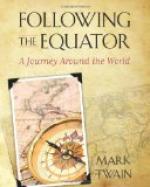“As the fallen gladiator in the arena looks for the signal of life or death from the president of the amphitheatre, so waited our friends in anxious suspense while the conference continued. In a few minutes, before a word was uttered, the women of the tribe threw up their arms three times. This was the inviolable sign of peace! Down fell the spears. Forward, with a heavy sigh of relief, and upward glance of gratitude, came the friends of peace. The impulsive natives rushed forth with tears and cries, as each saw in the other’s rank a loved one of the past.
“It was a jubilee
of joy. A festival followed. And, while
tears
flowed at the recital
of woe, a corrobory of pleasant laughter
closed the eventful
day.”
In four years, without the spilling of a drop of blood, Robinson brought them all in, willing captives, and delivered them to the white governor, and ended the war which powder and bullets, and thousands of men to use them, had prosecuted without result since 1804.
Marsyas charming the wild beasts with his music—that is fable; but the miracle wrought by Robinson is fact. It is history—and authentic; and surely, there is nothing greater, nothing more reverence-compelling in the history of any country, ancient or modern.
And in memory of the greatest man Australasia ever developed or ever will develop, there is a stately monument to George Augustus Robinson, the Conciliator in—no, it is to another man, I forget his name.
However, Robertson’s own generation honored him, and in manifesting it honored themselves. The Government gave him a money-reward and a thousand acres of land; and the people held mass-meetings and praised him and emphasized their praise with a large subscription of money.
A good dramatic situation; but the curtain fell on another:
“When this desperate tribe was thus captured, there was much surprise to find that the L30,000 of a little earlier day had been spent, and the whole population of the colony placed under arms, in contention with an opposing force of sixteen men with wooden spears! Yet such was the fact. The celebrated Big River tribe, that had been raised by European fears to a host, consisted of sixteen men, nine women, and one child. With a knowledge of the mischief done by these few, their wonderful marches and their widespread aggressions, their enemies cannot deny to them the attributes of courage and military tact. A Wallace might harass a large army with a small and determined band; but the contending parties were at least equal in arms and civilization. The Zulus who fought us in Africa, the Maories in New Zealand, the Arabs in the Soudan, were far better provided with weapons, more advanced in the science of war, and considerably more numerous, than the naked Tasmanians. Governor Arthur rightly termed them a noble race.”
These were indeed wonderful people, the natives. They ought not to have been wasted. They should have been crossed with the Whites. It would have improved the Whites and done the Natives no harm.




